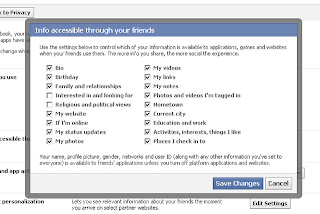More Customized
Content:
More Customized
Content refers to the ability of individuals to find content catered to them.
In my opinion, this is exactly the point of both of these genres of web
content, and social media and blogs are perfect examples to prove this trend
true: you get to choose who you are friends with, whose blogs you follow, what
type of content you want to see, what you like, and who gets to see what you
do.
One issue with
the so-called “customized content” of the Internet is trusting that the source
is honest or authentic. This topic is discussed in the European Journal of
Communication article “What’s left of trust in a network society? An
evolutionary model and critical discussion of trust and societal communication.”
It indicates that mistrust in “networks and communities is a problematic one,
not only for the media, but society at large.”
Because it is so
easy to gain access to the Internet, and so easy for people to create blogs,
individuals and society are left to question the authenticity of blogs. So,
even though it is easy to find customized content an individual is interested
in, as the article says, “the major problem here is the expectation of
communication being ‘authentic.’”
In my personal
use of social media, I focus on the websites/apps of Facebook, Twitter, and
Instagram. On Facebook, choosing who I am friends with, what groups I join, and
what I “like,” allows me to control what I see on my newsfeed everyday, and
even what kind of advertisements I view. On Twitter, I am able to follow news
about celebrities, events such as music festivals and concerts, and even what’s
going on at school socially, in my sorority, and throughout Greek life. On
Instagram, I can follow my friends, different organizations, and celebrities to
see what they’re doing, and even brands, to see new merchandise.

My main usage of
blogs is through following famous fashion and music blogs, the Tumblrs of my
friends, and my own Pinterest. I think Pinterest is the ultimate example of
“More Customized Content” because it is a website specifically designed to
allow you to find and “pin” things that interest you in particular. According
to Pinterest.com’s “About” Section, Pinterest is “A tool for collecting and
organizing things you love” used by millions, which gives you a place for
anything you’re interested in. Pinterest also helps a lot of bloggers come up
with ideas for blog posts, or find images to add to blogs such as Tumblr.
Photo and Info Sources:
(Screen shots
from my phone)
and
http://www.customcontentcouncil.com/
https://play.google.com/store/apps/details?id=com.tumblr
Quandt,
Thorsten. "What's left of trust in a network society? An
evolutionary
model and critical discussion of trust and societal communication." European
Journal of Communication. 27.1 (2012): 7-21. Print.
<http://ejc.sagepub.com/content/27/1/7>.
Word count: 436














